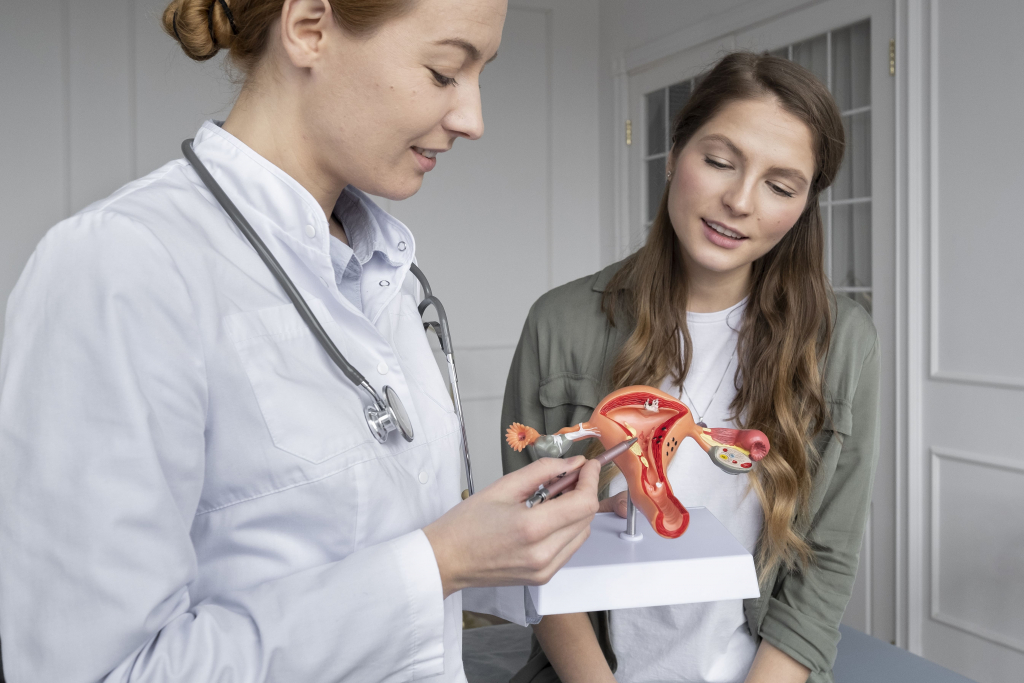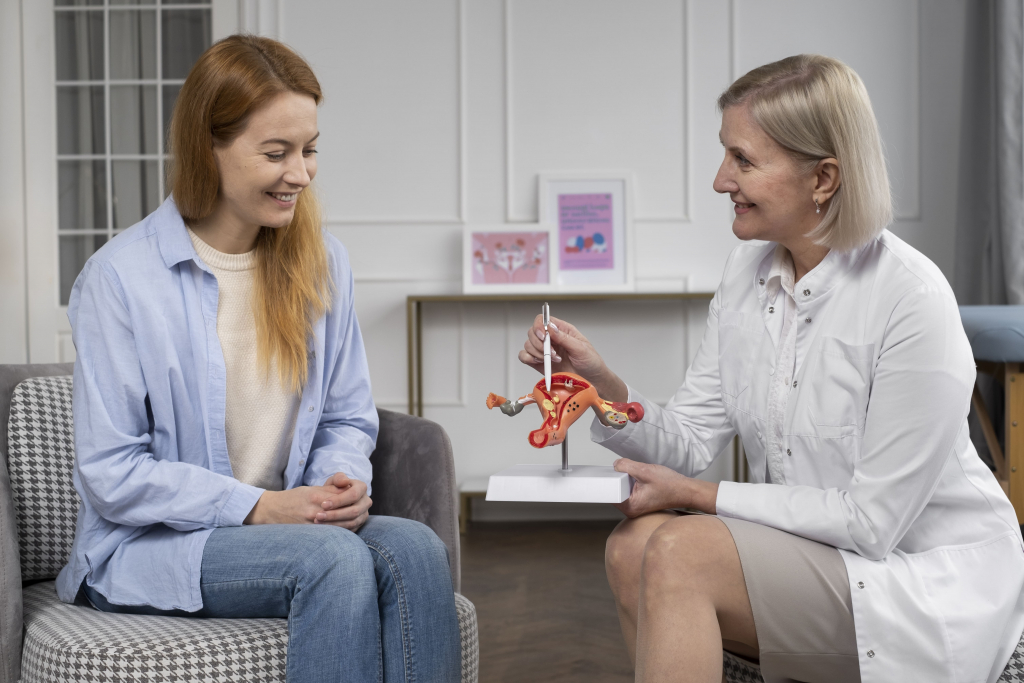
What is Follicular Phase?
Your menstrual cycle begins with the follicular phase, and it’s the first half of your menstrual cycle. Your ovaries have sacs called follicles that accommodate an egg.
The follicles chosen for that particular month begin to mature throughout this phase of your cycle, and the first day of your menstruation marks the beginning of the follicular phase, which lasts until ovulation.
Because increasing levels of estradiol (estrogen) induce the uterine endometrial lining to proliferate and thicken, the follicular phase is sometimes also referred to as the “Proliferative Phase.”
What Happens During Follicular Phase?
First, let’s learn more about follicles’ health, their anatomy, and development in women.
Women have approximately a million eggs when they are born. As they age, this reserve decreases. Your body starts maturing these eggs once you start menstruating.
Only one of the 11 to 20 eggs that start growing during the follicular phase of your menstrual cycle matures completely.
During this process, your brain and ovaries produce hormones that control the changes in your body that enable this process.

- First, your pituitary gland stimulates FSH to develop follicles; these are the fluid-filled sacs where your eggs can mature in your ovaries.
- Next, a single follicle in your ovaries, known as the dominant follicle, begins to develop more swiftly than the others. The egg will finally be released when you ovulate with a dominant mature follicle.
- Your body receives more estrogen from the dominant follicle. Your uterus’ lining becomes thicker due to the higher levels of estrogen, enabling an embryo to implant there (in case mating occurs). This phase is also known as the proliferative phase.
- The elevated estrogen flares a drop in FSH. As a result of this decline, the other follicles begin to degrade and reabsorb. Meanwhile, the dominant follicle’s egg matures fully.
High estrogen levels cause your pituitary gland to release an excess of luteinizing hormone (LH). This hormone is connected to the next phase—the luteal phase, toward the end of the follicular phase.
Finally, if you don’t get pregnant, this LH activates the mature egg to break out from the follicle and ovary (ovulation). This results in the shedding of the uterus lining.
7 Do’s & Don’ts to Keep in Mind During Follicular Phase
Let us now discuss some key follicular phase do’s and don’ts to keep in mind for better menstrual health.
1. Add essential supplements to your diet.
As per research, women with primary ovarian insufficiency may benefit from calcium and glucosamine supplementation due to the potential for a significant risk of developing osteoporosis in them.
Females also require vitamin D in addition to calcium, as this vitamin aids in calcium absorption. Fish oil, dairy products with added vitamin D, and sun exposure are sources of vitamin D.
2. Exercise regularly and maintain a healthy body weight.
During the follicular phase, when your menses has just finished, hormones drive the ovary to form follicles, raising estrogen and energy levels. As a result, you can increase workout intensity in the follicular phase of your cycle.
Consider performing more strength training exercises, cardio, HIIT, running, and boxing.
In case you suffer from PCOS, experts advise exercising daily and setting a goal of maintaining a moderate weight. This helps balance your hormones and ensure your cycle is well-aligned each month.
3. Maintain a good hormonal balance.

Hormonal balance can be disturbed by a variety of circumstances (both internal and external), including weight loss or growth, stress, injury, drugs, chemical exposures, and tumors.
Hormone imbalances occur with symptoms like fatigue, increased sensitivity to cold and heat, changes in bowel movement, dry skin, puffy eyes, weight fluctuations, urine incontinence, brain fog, and even memory loss.
Hormone imbalance in women has been related to several serious illnesses, including infertility, PCOS, thyroid, Addison’s disease, and Cushing’s Syndrome (high cortisol levels).
Thus, to keep your follicular phase well aligned every month, ensure your hormones are well balanced. To achieve this, consult your health care provider and follow a healthy lifestyle.
4. Don’t stress if you wanna conceive.
Changes in typical reproductive function are substantially correlated with higher reported stress levels during the follicular period.
Amenorrhea (not receiving your period on time), irregular ovulation or anovulation (not ovulating), and variations in cycle length can all be brought on by stress.
All the factors mentioned above can make getting pregnant harder or even impossible during the follicular phase. Therefore, during the follicular phase, avoid stress.
5. Add more Phytoestrogens to your diet.
High estrogen levels are also linked to symptoms like heavy bleeding, PMS, and uterine fibroids. Phytoestrogens are a class of phytonutrients that can help lessen the impact of estrogen, which may offer some relief.
Dried fruits, tofu, sesame seeds, garlic, and flax seeds are some foods containing phytoestrogens—so make sure to add plenty of these to your daily diet.
6. Don’t skip the good night’s sleep.
As the brain stimulates your pituitary glands to produce high FSH, this can trigger more poor-quality sleep in women during the follicular phase. Thus, it’s often hard to sleep and wake up in the morning. As a result, make sure to perform mindful activities like meditation before sleeping to increase your sleep quality.
7. Don’t forget foreplay!
Your sex drive is naturally low, which means you’ll need to increase massaging and touching action, rather than penetration, and creative foreplay is key to success here.
But many women feel, is sex safe even during follicular phase?—Yes, it is the answer. When you are on your period, you can have (very good) sex. Women can get turned on by the extra slippery fluids, while others might want to be left alone.
After your period is over, estrogen levels start to rise. This might improve your disposition and increase your propensity for social engagement. Experts claim that orgasms can even ease menstruation cramps—making sex during periods a significant win.
The Takeaway
Aboved listed tips and measures are advised based on general medical research. For maintaining a healthy and balanced follicular phase, you need to learn more about your body and take advice from your OB-GYN on which practices are most beneficial to you.
Finally, you should always keep in mind the importance of maintaining a healthy diet and workout schedule during your follicular timeline, and prepare your body in advance for the next phase of the process by following the best guidelines from your health practitioner.



